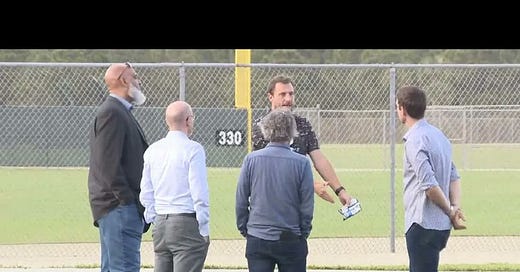Worker Power Can Get You Most Of It
Earlier this week, Tom Verducci had a piece in Sports Illustrated about the problems facing MLB, titled “Baseball’s Greatest Threat Isn’t the Lockout.” His central point, as you can probably glean from that title, is that baseball’s greatest threat is not the lockout. The lockout is merely a dispute about money, and there’s still plenty of money in the game, but the larger problems baseball faces are structural, regarding pace of play and declining fan interest. And the fact that the current labor negotiations are not addressing those issues is a real problem.
On his larger point, I agree with Verducci. The declining rate of action in baseball games is a huge problem for the sport, and it’s a bummer that’s being ignored in these negotiations. But where I disagree with him is where he posits a tension between what the players are fighting for in the lockout and what the game needs. His analysis treats the two problems—that is, the players and owners fighting over money on the one hand, and the game’s long-term trend away from action—as basically unrelated.
Verducci suggests that the necessary long-term fixes are either treated as chits to be bargained away for a larger slice of revenue, or casualties of a toxic relationship between labor and management. There is a sense, throughout his piece, that if only the two sides could stop bickering about money, they could get to the stuff that REALLY matters:
“Someday there will be an agreement. Much energy will be spent on breaking down the minimum salary, luxury tax rates, bonus pools and such. But here are the numbers that tell you where the game is going: how much the game has changed since the last CBA was signed—nearly all of it on the side of less exciting.”
But this is all wrong. The issues here are inseparable. In fact, the way to address the lack of excitement is by fixing “the minimum salary, luxury tax rates, bonus pools and such.” In the piece, Verducci repeatedly invokes “efficiency experts” in baseball front offices as the real enemy. He says the players should fight “less against the ‘greedy owners’ and more against front-office efficiency experts who…usurped from field personnel the power to determine how baseball is played.”
Except it wasn’t some front office coup that led to this “usurping” of power—the reason “efficiency experts” gained influence was that they served the interest of the owners! After all, the very meaning of “efficiency”—being able to rend as many wins as possible out of every dollar spent—is about protecting the owners’ financial interest. Why should players or fans care if a team wins “efficiently,” as long as it wins? It’s only the owners who care about this.
If the game has changed in favor of “efficiency,” it’s because the owners have benefited from those changes. Verducci understands this. In his list of issues with the game, he paints a clear picture of a game that has changed in ways meant to suppress salaries. In any season, roughly one-third of the league is tanking and has “no interest in adding even mid-level established players.” The games are longer and feature fewer balls in play because teams now use more young pitchers, who can all throw harder because they pitch for shorter periods, creating “a gig economy that added 167 pitchers to the majors and yet somehow reduced overall pay to players to its lowest level since 2015.” And more teams rely on shifts, decreasing the value of individual defenders.
And yet despite his perceptive diagnosis, Verducci’s proposed solutions don’t address the real problems. He suggests a pitch clock and banning shifts—these are reasonable suggestions, I guess, but they mostly tinker around the edges. There’s no real reason to believe either would fundamentally change the long-term trends.
If you want to get at the cause of the trends, you need to address why these “efficient” strategies have become so dominant… and that means going back to “the minimum salary, luxury tax rates, bonus pools and such.” Because one big reason there has been “a wholesale shift toward younger players” is that there is no bonus pool to properly compensate young players. And one reason teams won’t sign mid-level free agents is that the luxury tax functions as a de facto salary cap. And one reason tanking is so appealing is that minimum salaries are so low.
In other words, you can address all these issues by just paying players fairly! The reason the game has gotten so out of whack in recent years is that players are not being compensated according to their value. The power has tipped too far towards the owners—so in order to fix it, you need to tip it back to the players. In 2021, Ozzie Albies’ bWAR was 3.4, which was good enough to be one of the five best second basemen in baseball. For that, he was paid $3 million, which is less than what Chuck Knoblauch was paid to play second base in 1996. In such a world, it’s no wonder that teams behave the way they do. But if teams were not able to extract so much surplus value out of players like Albies, then there wouldn’t be such incentive to tank, or such reluctance to sign so-called “middle class” free agents.
There’s a tendency to think of labor fights as merely “distributional” questions. In sports especially, you will often hear comments along the lines of “Well, there’s tons of money to divvy up, so they’ll figure it out.” But as Verducci’s piece shows, it’s not just about money, but power over the game itself. Paying players fairly is not just about taking money from owners and giving it to players—it’s about improving the quality of baseball being played. You can put up a pitch clock, or ban shifts, or make whatever other tweaks you want, but unless you really change the power structure, you’re not going to get the changes you want. And that’s why it’s so important to back unions and empower workers, even when those workers already make a lot of money.


I don’t mean to be narrow-minded about this—I know it’s annoying when people say whatever issue they’re passionate about happens to be the answer to all the world’s problems. I’m not saying that paying players more will solve every problem with baseball (just most of them), but it’s important to at least recognize the problem’s roots. The reason things are bad, in baseball and in the world, is not that nobody’s ever thought of ways to make them better; it’s that the people in charge—the ownership class, the capitalists—benefit from the badness. If you want things to change, you need to take their power away. A pitch clock doesn’t really do that…



